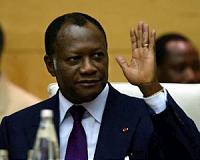| . |  |
. |
Abuja, Nigeria (UPI) Jan 20, 2011 Nigeria, Africa's most populous nation, faces a potentially divisive presidential election in April that could have immense ramifications across a continent where the notion of democracy is often little more than a thin veneer to mask brutal dictatorships. Recent elections in Africans states -- Kenya, the Ivory Coast and Guinea to name but three -- were violent, murderous affairs that worsened political crises and gave little hope of easing the chronic instability of the resource-rich continent. "This year will see a record number of elections in Africa," the Financial Times observed Tuesday. "Of these, Nigeria's have perhaps the greatest potential to sway political momentum. "If Africa's most populous state can hold a credible process, it would help signal an end to a democratic reversal in which governments have gone through the electoral motions but rarely offered the real thing." The crisis in the Ivory Coast, once part of France's colonial empire in Africa, emerged from a disputed presidential election in November, the first in a decade. The incumbent, Laurent Gbagbo, refuses to step down after he was defeated by former Prime Minister Alassane Ouattara. Gbagbo's allies in the constitutional court overturned U.N.-certified results that gave Ouattara, his longtime rival, an 8 percent lead in a Nov. 28 runoff poll, an internationally recognized victory. The defiant Gbagbo, who controls most of the 7,000-man military, remains holed up in the presidential palace in Abidjan. The 15-member Economic Community of West Africa, including regional military heavyweight Nigeria, has threatened to send in a regional force to oust him if he refuses to step down. Although most of the world is ranged against him, Gbagbo shows no sign of doing so and appears to be pushing the country of 20 million people toward a new civil war that will likely involve other regional states. By U.N. count, nearly 200 people have been killed in factional fighting in the streets over the last few weeks. However, the death toll is believed to be higher, with Ouattara's supporters claiming dozens of their people were slain by Gbagbo death squads. Any attempt to remove to Gbagbo by force will likely touch off a new wave of bloodshed and reignite the north-south civil war of 2003-06. The crisis is widely seen as a test for African democracy, particularly the member states of ECOWAS, which have a combined population of around 300 million. "Beyond Ivory Coast, the way this crisis will be solved will affect the future of democratic elections in Africa," a senior Ivorian official observed. With elections scheduled this year in Nigeria, Cameroon, Liberia and elsewhere, "the democratic process has to win." Elections in West Africa have always been risky ventures since the colonial era ended in the 1960s. They have invariably presaged civil wars. New oil wealth has created dangerous new dynamics. ECOWAS has intervened militarily twice before, in the civil wars in Sierra Leone and Liberia, where the leaders of those countries used contested elections to launch revolutions. In neither was the intervention decisive militarily and the forces sent in became involved in the conflicts they were dispatched to quell. Any ECOWAS military intervention in Ivory Coast, backed by the United States and its allies, could backfire by mustering support for Gbagbo. It would also rely heavily on Nigeria, the dominant military force in the region. But that country is caught up in bloodshed between the Christian south and the Muslim north and a 5-year-old insurgency in the oil-rich Niger Delta that threatens its all-important oil industry and has spawned terrorist bombings. President Goodluck Jonathan, a southern Christian who took over following the May 2010 death of President Umara Yar'Adua, a northern Muslim, is unlikely to risk domestic upheaval by sending troops to Ivory Coast. Jonathan, a reformer, also faces rampant official corruption -- a continent-wide phenomenon -- and a patronage system dominated by vested interests that has blocked others who sought to change the system. The April polls "promise to be the most tightly contested since the military returned to barracks in 1999" after a decade of military dictatorships, the Financial Times noted. "In a potentially divisive contest, pitting a Christian candidate against Muslim challengers, it is imperative that voters are neither bullied nor bought."
Share This Article With Planet Earth
Related Links Africa News - Resources, Health, Food
 Ouattara: West Africa ready to intervene in I.Coast
Ouattara: West Africa ready to intervene in I.CoastParis (AFP) Jan 19, 2011 West African armies are making preparations to invade Ivory Coast to overthrow strongman Laurent Gbagbo, his rival Alassane Ouattara claimed Wednesday in an interview with French daily La Croix. "Everything is being put in place," said Ouattara, who was recognised as the winner of November's Ivorian presidential election by the international community but has been unable to take power as Gba ... read more |
|
| The content herein, unless otherwise known to be public domain, are Copyright 1995-2010 - SpaceDaily. AFP and UPI Wire Stories are copyright Agence France-Presse and United Press International. ESA Portal Reports are copyright European Space Agency. All NASA sourced material is public domain. Additional copyrights may apply in whole or part to other bona fide parties. Advertising does not imply endorsement,agreement or approval of any opinions, statements or information provided by SpaceDaily on any Web page published or hosted by SpaceDaily. Privacy Statement |